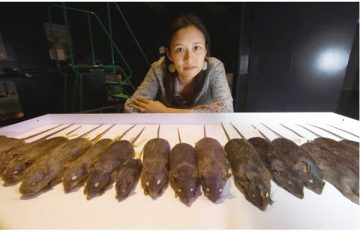Researcher Dr. Rana Sarfraz from the Biodiversity Research Centre at UBC and rat specimens from the Beaty Biodiversity Museum were featured in a recent article in The Province:
Vancouverites ‘might have to learn to live with rats’ as population scurries upwards: Expert
Vancouver’s rat population is growing and no neighbourhood is immune to the rodents and their pesky and dirty ways.
Dr. Rana Sarfraz, a UBC ecologist and expert on pests, said that Vancouver’s rat problem has been getting worse in recent years and it’s not limited to the downtown core.
And Orkin Pest Control branch manager Bill Green said while his company plucks up thousands of rat corpses in the city every month, he’s noticed a southbound migration of the rodents.
The rocky shores of False Creek have long been a breeding ground for rats, from Granville Island to Science World, but over the past two years Green said an increasing number of calls are coming from elsewhere.
“From False Creek area going up Main St, gradually moving a bit more from 1st, 2nd, 3rd, 4th, 5th and up. There’s been a steady increase in that area,” Green said, adding that he cannot explain this migratory trend.

Yukiko Stranger-Jones, Exhibits Manager of UBC Beaty Biodiversity Museum, displays a selection of stuffed rats from the Cowan Tetrapod Collection. Photo: Arlen Redekop, The Province
Sarfraz said Vancouver is welcoming to rats because of plentiful food sources and an active port that brings “hitchhiking” rats from abroad.
Vancouver’s mild climate means rats breed most of the year, he said.
“Rats living in large numbers close to human beings — there are always problems. They could cause not only serious economic bite on people, but they can also cause serious health risks,” said Sarfraz.
The “economic bite” is felt by restaurants where a monthly fee for rat patrol in the hundreds of dollars is just a cost of doing business. Rats spoil and contaminate food and also cause property damage, or even indirectly cause fire, when they chew through wiring, he said.
The enterprising critters can even cause thousands of damage to your car, said Roy Klymchuk, of ICBC, who said rats have been known to chew through a car’s wiring and sometimes build nests in the engine.
Extensive damage by rats to a car’s wiring can cost thousands of dollars, said Klymchuk.
“It can be a real conundrum because it can get quite costly,” he said.
And then there is the stench they can leave behind in a car.
“I don’t want to cast any aspersions on their personal hygiene … but they can be stinky creatures,” Klymchuk said.
Sarfraz said rats can spread infectious diseases, as well as cause allergic reactions from rat hair, droppings and urine.
Sarfraz said not a lot is known about urban rats and their specific health risks to humans. The size of the city’s rat population is also a mystery, he said.
The City of Vancouver keeps no data on rats, but a city spokesperson said there hasn’t been an increase in complaints in recent years.
Sarfraz said urban rats remain a mystery because there has never been a comprehensive study of rats in Canada – until now.
The Vancouver Rat Project is underway now, and claims to be the first study of its kind in Canada.
Based in the Downtown Eastside, the project is aimed at filling in the gap around the health risks posed by rats and humans living together. According to the project’s website, “without a thorough understanding of rats and the diseases they carry, we cannot even begin to accurately gauge rat-associated health risks or to develop strategies to monitor and mitigate those risks.”
Their work will include trapping rats, testing them for pathogens and then determining if humans are at risk.
The study includes researchers and scientists from several organizations, including the B.C. Centre for Disease Control and the B.C Centre for Excellence in HIV/AIDS. The study’s primary researcher declined to be interviewed for this story, pending the release of some forthcoming results.
Sarfraz said tolerance of rats is also something we can learn.
He said: “Being a coastal area, it would be almost impossible to completely eradicate rats. So we might have to learn to live with rats.”
Source: The Province
